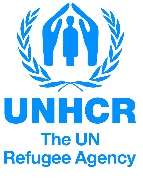Celebrations in Kabelawa Camp with the establishment of a Primary School
 Ibrahim and friends enjoying their first classes in the newly established primary school in Kabelawa camp (UNHCR Diffa)
Ibrahim and friends enjoying their first classes in the newly established primary school in Kabelawa camp (UNHCR Diffa)
There was cause for celebration in the IDP camp of Kabelawa this month, with the opening of a primary school in the camp. 477 students are now enrolled and attending school on a regular basis, including 50% girls. Sadly, education has been one of the main victims of the conflict in Northern Nigeria and in the Diffa region of Niger. The insecurity in the region has led to the closure of many schools, while those fleeing Northern Nigeria were forced to abandon their schooling. However, concerted efforts are being made to re-establish systems to provide education to those affected.
Ibrahim, like many of those living in Kabelawa camp, was amongst those evacuated from the Lake Chad islands in May 2015. He and his family were forced to abandon everything – their livestock, their homes, and move to the camp. Ibrahim was also forced to abandon his education. However, through efforts from the government, UNHCR and the NGO COOPI, the month of March saw jubilation in the camp, with the commencement of the first classes in the newly established school. Ibrahim and his friends (pictured above) are now enjoying daily classes, and are working hard to catch up on what they missed. As stated by Ibrahim, “I love my school…since we left home I have wanted to return to school. We are all very happy to be able to continue learning here, even if we are far from home”.
Due to insecurity in the region, it was not possible to open the doors of the school in October as planned, however the teachers and the students are making big efforts to catch up on the 5 months of the academic year which they missed, and are even taking classes in the evenings and at weekends to cover the material they missed.
In the refugee camp in Sayam Forage, the primary school was opened in October, to coincide with the academic year. 175 refugee students are regularly attending the school. As stated by Adamou, a teacher at the school, “It is essential that the children continue their educations…even in these challenging times. It is a means for them to avoid becoming involved in insurgent activity, and will give them hope for the future”.
Outside of the camps, UNICEF is the lead organisation in the provision of education for displaced children. There are currently 135 official sites along the Route National 1 – the main road in the region. UNICEF currently supports the provision of 31 temporary schools benefitting 1,444 displaced children, including 60 temporary classrooms, and 10 newly constructed permanent classrooms. They also support the government in the provision of temporary classrooms for up to 2,100 additional children. The idea is to integrate the displaced children into the regular education system. For more information on UNICEF’s out-of-camp primary education support, see: http://www.unicef.org/infobycountry/niger_90717.html.
For secondary education outside of the camps, COOPI, with UNHCR support have established 4 Distance Learning Centres in the localities of Diffa, Kabelawa, Maine Soara and Bosso. Unfortunately the centre in Bosso had to be closed due to the insecurity in the area. The Distance Learning Centres are aimed at assisting Anglophone refugees living outside of the camps to continue their education in English, through the Nigerian curriculum. The programme has been approved by the Nigerian and Nigerien governments, allowing the students to complete their exams at the end of the academic year. Almost 400 students are currently benefitting from this programme in the region, which will be scaled up in 2016 with an interactive learning platform.

